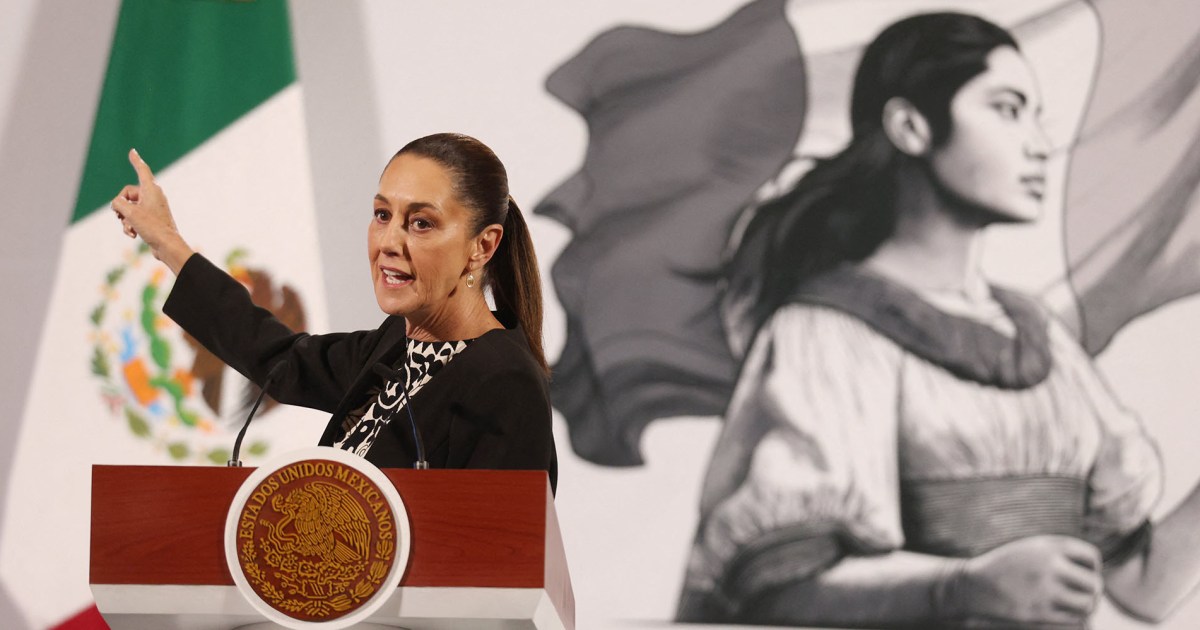The U.S. and Mexico reached an agreement Monday to delay a 25% tariff on all Mexican imports for one month, after Mexico agreed to ramp up security at its border — averting, at least for now, a move that could have driven up prices for U.S. consumers and stalled both countries’ economies.
Mexican President Claudia Sheinbaum posted on social media that Mexico will immediately reinforce the northern border with 10,000 members of the its national guard to address drug trafficking from Mexico into the U.S., particularly fentanyl.
Trump said in his own post on social media that the U.S. will continue negotiations with Mexico over border security, headed by Secretary of State Marco Rubio, Treasury Secretary Scott Bessent and Commerce Secretary Howard Lutnick.
The move came after Trump signed an executive order Saturday to place a 25% tariff on nearly all goods coming into the U.S. from Canada and Mexico starting on Tuesday.
The move triggered retaliatory tariffs from Canada, and Mexico had threatened to do the same.
Stocks fell in response to the tariffs, as economists and business executives warned they could raise prices in the U.S. and trigger an economic slowdown. The U.S. imports more goods from Mexico than any other country.
During his first term, Trump had also threatened to place tariffs on Mexico, before backing away less than two weeks later when Mexico responded with plans to deploy its national guard throughout that country to crack down on immigration and expand a program in which some migrants seeking asylum in the United States would wait for their immigration court hearings in Mexico.
Trump also said on social media that he had spoken with Canadian Prime Minister Justin Trudeau Monday morning and would speak with him again in the afternoon.
Trudeau announced Saturday night that Canada would respond by issuing its own 25% tariff on $155 billion Canadian worth of U.S. goods. That would include immediate tariffs on $30 billion worth of goods as of Tuesday, the day the U.S. said it would begin collecting tariffs on Canadian goods.
Trudeau said the rest of the tariffs would come in about three weeks “to allow Canadian companies and supply chains to seek to find alternatives.”
Since the announcement on Saturday, administration officials and Trump have shared mixed messages about the intention of the tariffs and what steps would need to be taken to have them lifted.
The White House said in the executive order issuing the tariffs that the move was in response to the flow of fentanyl and immigrants coming into the country from Canada and Mexico, which Trump was declaring a national emergency. Under the International Emergency Economic Powers Act, the president has authority over trade in a national emergency.
Nearly all of the 21,900 pounds of fentanyl seized by U.S. law enforcement in 2024 was at the southern border, with just 43 pounds of fentanyl seized at the northern border, according to data from U.S. Customs and Border Protection.
But in several social media posts over the weekend, Trump seemed to contradict that rationale, instead citing a trade deficit with the three countries and calling on companies to make their products in America. In another posting, Trump said the tariffs would pressure Canada to join the U.S.
“We pay hundreds of Billions of Dollars to SUBSIDIZE Canada. Why? There is no reason. We don’t need anything they have. We have unlimited Energy, should make our own Cars, and have more Lumber than we can ever use. Without this massive subsidy, Canada ceases to exist as a viable Country. Harsh but true! Therefore, Canada should become our Cherished 51st State. Much lower taxes, and far better military protection for the people of Canada — AND NO TARIFFS!” Trump said on Truth Social.
Administration officials went on cable news this morning to reiterate that the move was about drugs and immigration and accused Canada of misunderstanding the intention of the tariffs.
“This isn’t a ‘trade war’ with Canada, or Mexico, or China — this is about fentanyl,” said Interior Secretary Douglas Burgum on Fox News. “We’ve had a mass invasion of our country.”

